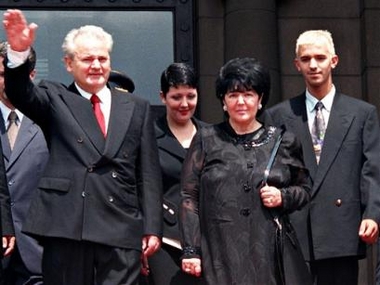|
History now will be Milosevic's judge: AP
(AP)
Updated: 2006-03-12 10:50
One of history's most important trials has ended abruptly with the death of
former Yugoslav leader Slobodan Milosevic. After four years, hundreds of
witnesses, tens of thousands of documents and tens of millions of dollars,
Milosevic can never be pronounced guilty or innocent.
 |
| This is a July 23, 1997 file photo of former Yugoslav President
Slobodan Milosevic, his wife Mirjana Markovic, daughter Marija and son
Marko. Slobodan Milosevic, the former Yugoslav leader branded by some in
the West as 'the butcher of the Balkans' but hailed as a hero by many
fellow Serbs, was found dead Saturday in his bed at a U.N. prison near The
Hague, where he was standing trial for war crimes. The former president's
Socialist Party said the family will decide when and where Milosevic will
be buried. Milosevic and his wife Mirjana Markovic were high school
sweethearts. [AP] |
The trial's premature conclusion also raises questions about the conduct of
tribunal judges who made key decisions that led to an exhausting, expensive
five-year process.
"That's $200 million down the drain" said Michael Scharf, a former State
Department attorney and an expert in international criminal law.
As in previous cases with the death of a defendant, the indictment was to be
withdrawn.
"The proceedings will be terminated," tribunal spokeswoman Alexandra Milenov
said.
Milosevic, 64, who was extradited to The Hague in June 2001, was found
lifeless in his bed early Saturday at the U.N. detention center. He had been
defending himself against 66 counts of war crimes, crimes against humanity and
genocide in Croatia, Bosnia and Kosovo during the 1990s.
"It's a huge setback for justice," said Richard Dicker, legal adviser of
Human Rights Watch. "Most of all, it's a setback for the victims."
Chief U.N. war crimes prosecutor Carla Del Ponte said she regretted
Milosevic's death because she believed she would have won his conviction.
According to the schedule dictated by the court, he had only a few weeks to
go before winding up his defense and handing over the massive case to the three
judges to begin their deliberations.
The International Criminal Tribunal for the former Yugoslavia was created in
1993 to try those responsible for atrocities during the Balkan wars then raging.
It was the first experiment in international war crimes jurisprudence since
World War II, and was the model for the creation of more tribunals.
But the success of the court was being weighed by the happenings in Courtroom
I, where the defiant, combative Serb leader sparred with witnesses and judges
alike.
His victims and former enemies lamented their lost chance to hear the verdict
of impartial judges.
"Justice was late," said Hashim Thaci, the leader of ethnic Albanian armed
insurgency against Milosevic's forces in 1998-99 in Kosovo's capital Pristina.
"God took him."
|